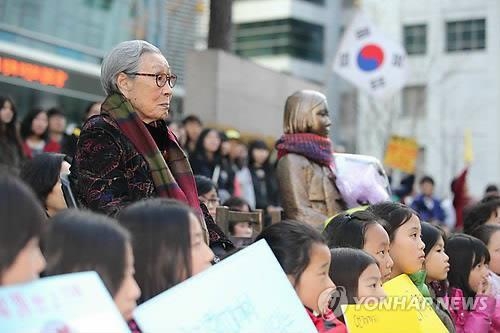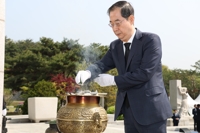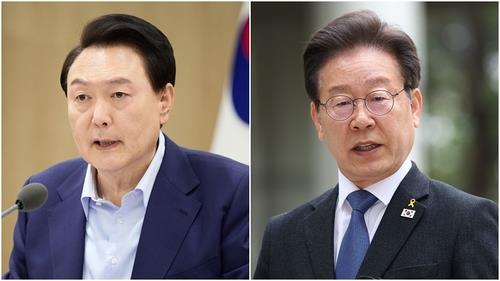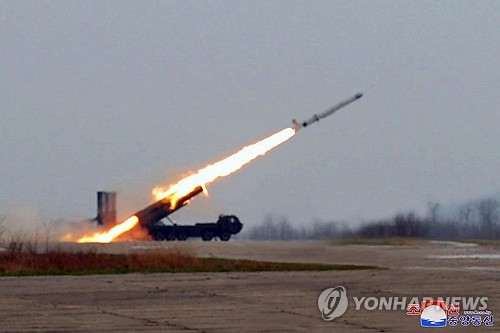(LEAD) No progress made in S. Korea-Japan talks on wartime sex slavery
(ATTN: UPDATES throughout)
SEOUL, Nov. 27 (Yonhap) -- No tangible progress was made Thursday in the South Korea-Japan talks held in Seoul over Japan's sexual enslavement of Korean women during World War II, a government official said.
The fifth round of meetings on the wartime sex slavery issue drew particular attention, as it came after leaders of the two countries agreed last month to "encourage" the director general-level talks to make progress in one of the thorniest bilateral issues.
Lee Sang-deok, Seoul's director general for Northeast Asian affairs, met with his Japanese counterpart, Junichi Ihara, at the headquarters of the Ministry of Foreign Affairs in central Seoul earlier in the day.
"It's difficult to say whether (Japan) came up with anything sincere, but (both sides) had pretty in-depth and detailed discussions," the foreign ministry official said, indicating that no particular breakthrough was made on Thursday.
"The government aims to console the living victims by producing agreeable solutions (from the bilateral talks) and will go on with patience to achieve the goal," the ministry official said, asking for anonymity.
In the meeting, Seoul complained about the growing denial among the Japanese media and government of coercion in the Japanese Imperial Army's recruiting of Korean women as war-time sex slaves and called on Tokyo to stick to its previous apology over the so-called comfort women issue, the official also noted.
Both sides agreed to work toward holding the next round of talks in Tokyo during December, he said.
The neighbors also agreed to work together to arrange a trilateral meeting of foreign ministers from Seoul, Tokyo and Beijing to restore fractured cooperation among the three Northeast Asian nations, the Seoul official said, adding that the timing of the meeting should be determined in the future.
Seoul also requested that Japan provide documents needed to locate the remains of Ahn Jung-geun, a Korean independence fighter who was executed by Japan for assassinating Hirobumi Ito, the first governor-general that Japan sent to the peninsula before Japan's colonialization of the peninsula.
Where he was buried after he was executed is still unknown as the country is set to mark the 105th anniversary of Ahn's death next year.
South Korea and Japan had kicked off a monthly dialogue in April over the thorny wartime sexual slavery issue, which has severely impaired bilateral relations.
Both sides had called off the July round of talks as tensions ran deep over Japan's review of its 1993 apology over the matter. The previous session took place in September.
Historians say up to 200,000 women, mostly from Korea and China, were coerced into offering sexual services for the Japanese Imperial Army during World War II. Only 54 victims remain alive in South Korea, with their average age standing at 88.
The Seoul government has consistently urged Japan to take sincere, substantive actions, including an apology and compensation, to satisfy the victims, but the prospect of a breakthrough appears dim if recent incidents serve as any indication, according to Seoul officials and experts.
Japan's prominent liberal newspaper, the Asahi Shimbun, admitted that its recent stories on comfort women carried errors as they were based on false testimony by former soldier Seiji Yoshida, who said he had taken part in abducting women on South Korea's southern island of Jeju for military brothels overseas.
The retraction led hard-line voices in Japanese society to grow, with Japanese Prime Minister Shinzo Abe saying in a recent interview with the Japanese daily Sankei Shimbun that his country should "restore its honor and trust" in the international community through the "right" perception on history regarding the sex slavery issue.
Japan has long dismissed South Korea's demands, claiming that all grievances related to its 1910-45 colonial rule of the Korean Peninsula were settled through a 1965 treaty that normalized their bilateral ties.
Relations between the neighbors have worsened in recent years, as Japan has made attempts to whitewash its wartime atrocities. Since taking office in February 2013, South Korean President Park Geun-hye has shunned a summit with Abe, calling on Tokyo to first show sincerity over such sensitive issues.
graceoh@yna.co.kr
(END)
-
 Overdue debut of Korean abstract art pioneer Yoo Young-kuk at Venice Biennale
Overdue debut of Korean abstract art pioneer Yoo Young-kuk at Venice Biennale -
 Defense chief says N. Korea's hypersonic missile 'unsuccessful' in last-stage glide flight
Defense chief says N. Korea's hypersonic missile 'unsuccessful' in last-stage glide flight -
 Relax, immerse yourself in scents at Venice Biennale's Korean Pavilion
Relax, immerse yourself in scents at Venice Biennale's Korean Pavilion -
 N. Korea has capability to genetically engineer biological military products: U.S. report
N. Korea has capability to genetically engineer biological military products: U.S. report -
 S. Korea marks 30th anniv. of Korean Pavilion at Venice Biennale with contemporary art
S. Korea marks 30th anniv. of Korean Pavilion at Venice Biennale with contemporary art
-
 Overdue debut of Korean abstract art pioneer Yoo Young-kuk at Venice Biennale
Overdue debut of Korean abstract art pioneer Yoo Young-kuk at Venice Biennale -
 Relax, immerse yourself in scents at Venice Biennale's Korean Pavilion
Relax, immerse yourself in scents at Venice Biennale's Korean Pavilion -
 Artist Lee Bae captures ethereal Korean aesthetics at Venice Biennale
Artist Lee Bae captures ethereal Korean aesthetics at Venice Biennale -
 S. Korea marks 30th anniv. of Korean Pavilion at Venice Biennale with contemporary art
S. Korea marks 30th anniv. of Korean Pavilion at Venice Biennale with contemporary art -
 Defense chief says N. Korea's hypersonic missile 'unsuccessful' in last-stage glide flight
Defense chief says N. Korea's hypersonic missile 'unsuccessful' in last-stage glide flight
-
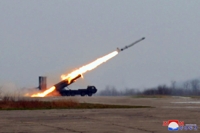 N. Korea says it conducted 'super-large warhead' test for strategic cruise missile
N. Korea says it conducted 'super-large warhead' test for strategic cruise missile -
 (2nd LD) N. Korea says it conducted 'super-large warhead' test for strategic cruise missile
(2nd LD) N. Korea says it conducted 'super-large warhead' test for strategic cruise missile -
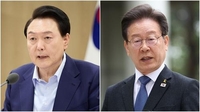 (LEAD) Yoon proposes first-ever meeting with opposition leader
(LEAD) Yoon proposes first-ever meeting with opposition leader -
(URGENT) N. Korea conducted 'super-large warhead' test for strategic cruise missile: KCNA
-
 Gov't likely to accept university chiefs' request to lower med school enrollment quota
Gov't likely to accept university chiefs' request to lower med school enrollment quota
